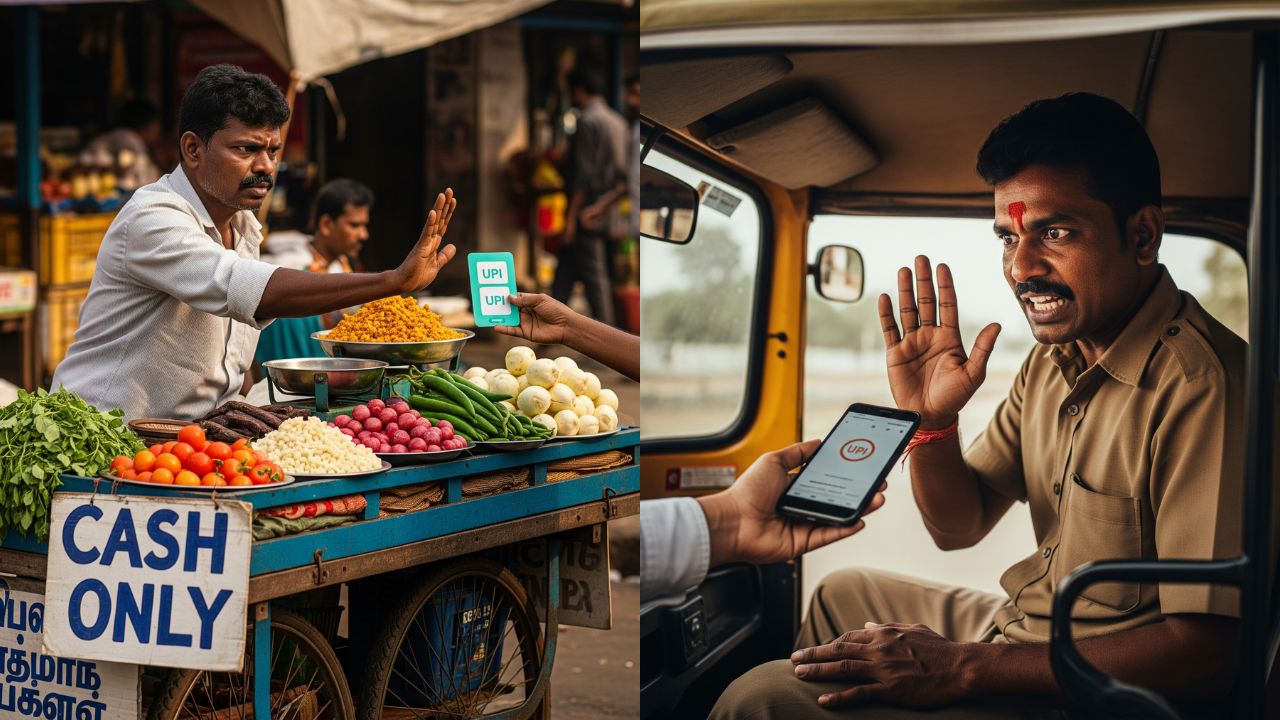Unfair: When Salaried Employees Pay Tax, Why Not Street Vendors and Small Businesses?
Editor: Chandan M
Published on: July 18, 2025, 5:46 p.m.

Bangalore | Karnataka: A growing number of street vendors and micro-business owners in Bengaluru are rejecting digital payments such as UPI, shifting to cash-only transactions. This reaction follows a recent crackdown by the state’s Commercial Taxes Department, which issued GST show-cause notices to traders whose digital receipts crossed the annual thresholds of ₹40 lakh for goods or ₹20 lakh for services. What’s Behind the Move? Data-driven scrutiny Authorities conducted a data analysis of UPI transactions from financial years 2021–22 to 2024–25, identifying thousands of unregistered traders with transaction volumes above the GST registration limits. More than 5,000 of these traders received notices from the tax department. Widespread confusion and fear Many small vendors mistakenly believe that all UPI inflows—regardless of whether they come from sales, personal transfers, or repayments—are counted as taxable business turnover. This belief has sparked widespread fear among informal businesses, with many worried they will be forced into GST registration, face audits, file returns, and potentially pay backdated penalties. Shift away from digital payments In an attempt to avoid tax scrutiny, numerous vendors have begun removing QR codes from their stalls and refusing digital transactions altogether. Signs reading “No UPI, Only Cash” are now a common sight even in tech-friendly neighborhoods and business districts. What was once hailed as a symbol of India’s digital transformation is now viewed by many small traders as a liability. Official Clarification from the Commercial Taxes Department In response to public concerns, the Additional Commissioner of the Commercial Taxes Department issued a statement on Thursday to clarify the basis of the notices. The department emphasized that GST liability is not determined by UPI data alone. Officials explained that notices were based on overall business consideration—including payments made via point-of-sale (POS) machines, bank transfers, cash, and other digital platforms. The UPI transaction trail was just one part of the broader financial picture examined. "The GST is applicable on the consideration received for the supplies in any form, and UPI is only a method of receiving such consideration. The department will take suitable action to collect the applicable tax under the GST Act from the traders who have received consideration in any form," said the department in a public press release. They further clarified that avoiding UPI or shifting entirely to cash does not exempt any trader from GST obligations if their total turnover exceeds the legal threshold. Rising Concern Over Tax Equity The developments have prompted renewed debate about fairness in tax enforcement. Salaried employees face mandatory tax deductions through TDS mechanisms, while informal sector vendors often operate without similar oversight. The recent shift in payment practices raises questions about whether GST enforcement is being applied uniformly across economic classes. Implications for Digital India India’s rapid progress in digital financial inclusion, particularly since the introduction of UPI, is now at risk. For many small vendors, digital payments are no longer seen as a convenience but rather a source of anxiety due to potential tax consequences. Experts in digital finance warn that this trend could undermine trust in the digital economy, especially among low-income, cash-based businesses that were just beginning to embrace online payments. Policy Recommendations To address the growing uncertainty, experts and trade organizations are calling for: Clear and accessible public guidance on how UPI inflows are treated under GST regulations. Simplified registration and return filing mechanisms, especially for small and seasonal traders. Outreach in regional languages to improve understanding of tax obligations. Efficient redressal systems to correct misinterpretations or erroneous notices. Conclusion The rise in cash-only transactions among Bengaluru’s small and informal businesses reflects a deepening fear of tax enforcement—often driven by confusion rather than evasion. The government's clarification on GST applicability offers some relief, but broader reforms are needed to ensure that digital adoption and tax equity advance hand in hand. Without that, India risks creating a financial divide between formal and informal sectors—despite its progress in building one of the world's largest digital economies.